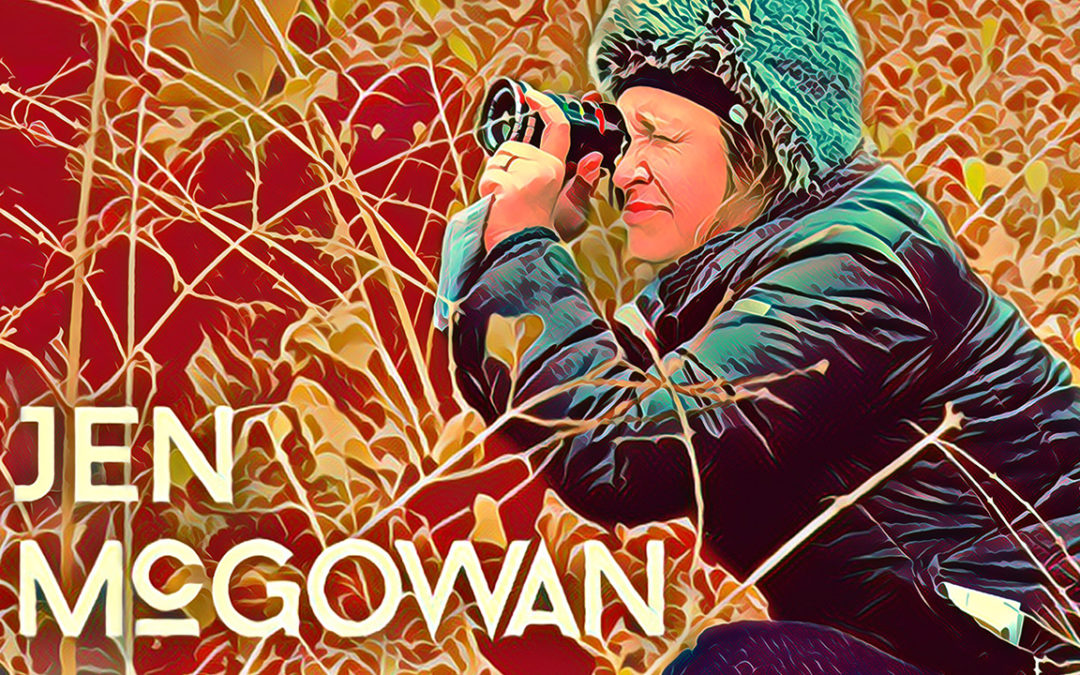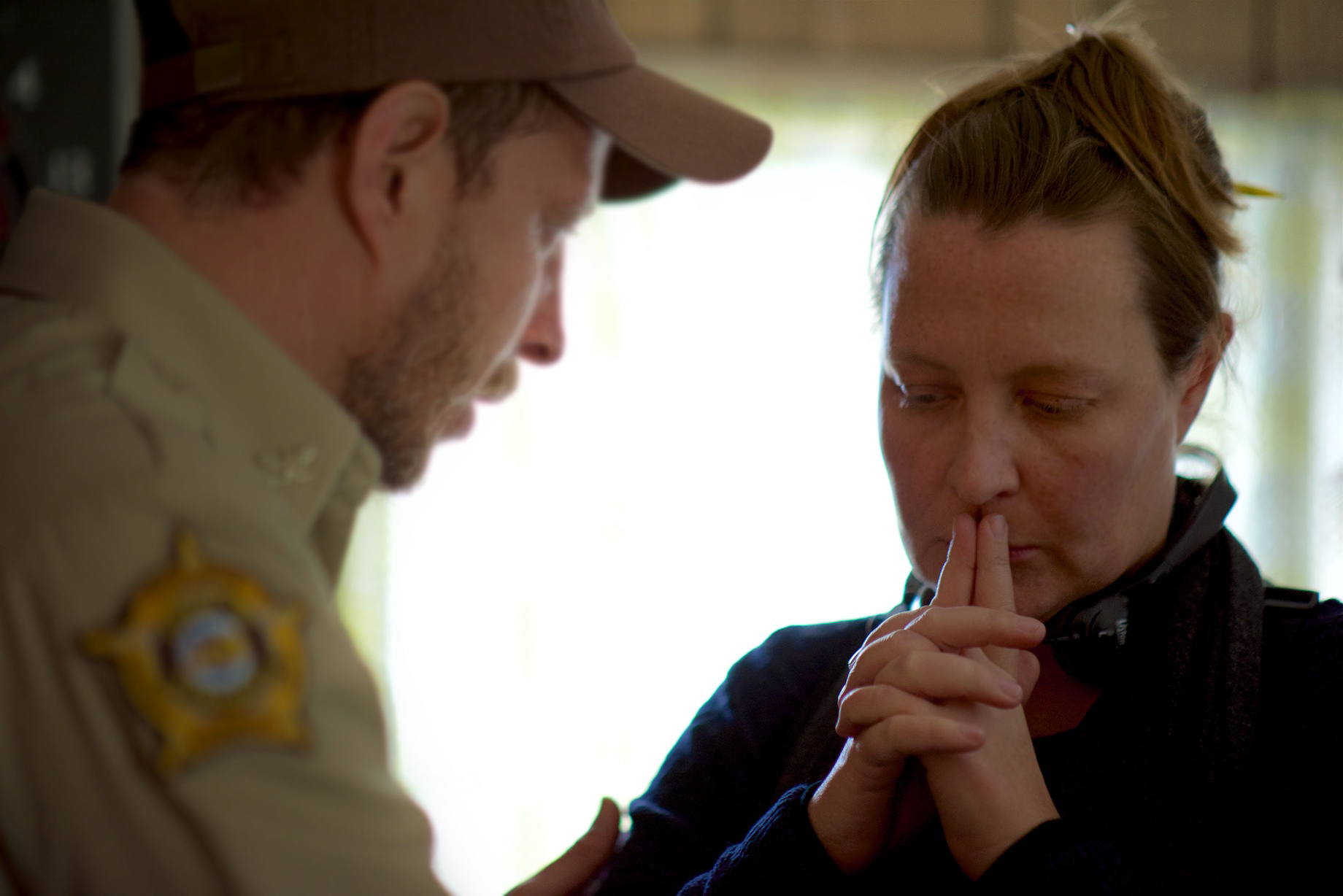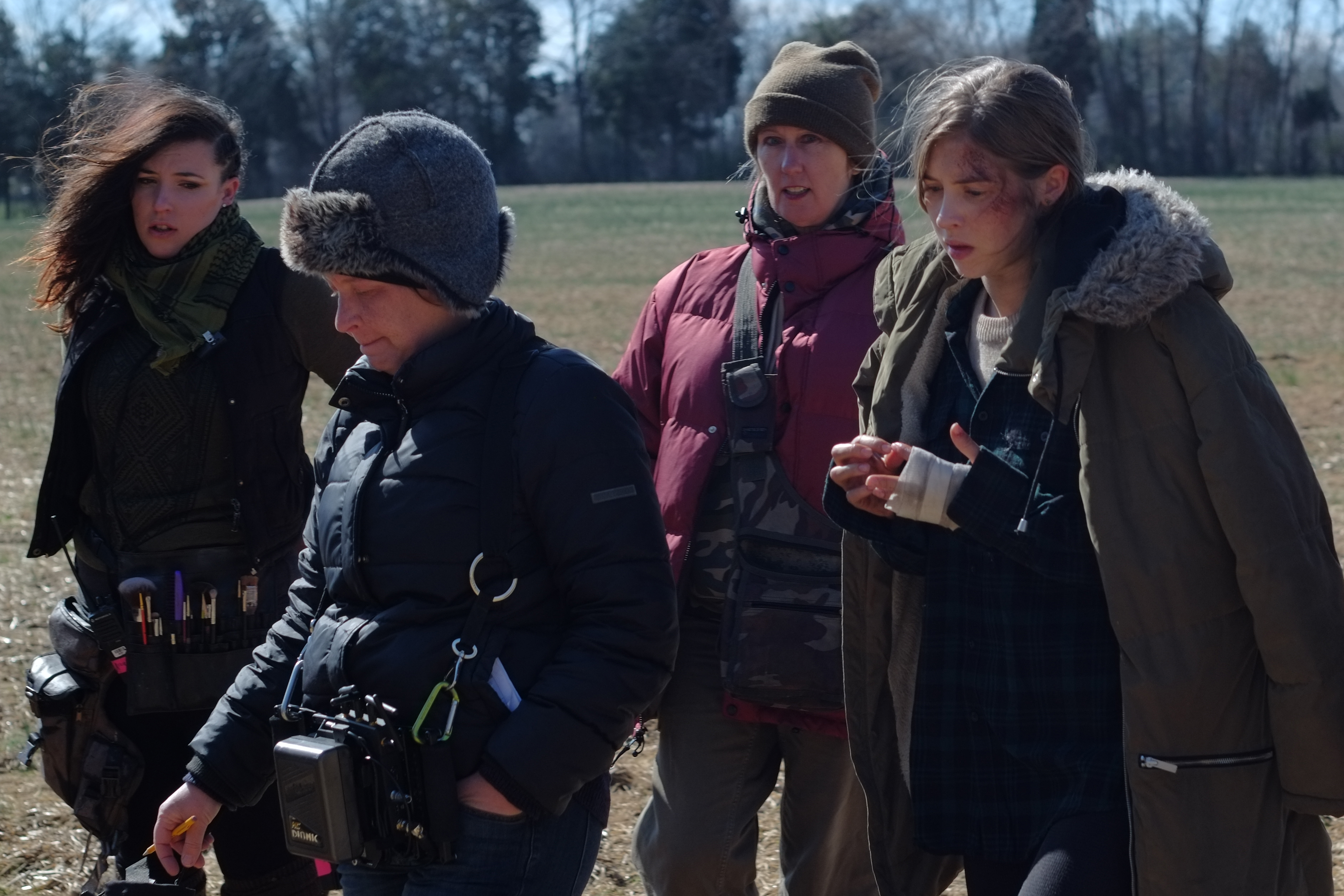About Jen McGowan
Jen McGowan is a director based in Los Angeles. Her first feature, Kelly & Cal, premiered at SXSW where she won the Gamechanger Award. Her award winning short film Touch has played at over a hundred film festivals worldwide, and was distributed by PBS, NBC Universal, Shorts International and Canal Plus.
She is a Film Independent Fellow, the founder of Film Powered, a recipient of the Alliance of Women Directors Breakout Award and was included on Vulture’s list of Women Directors Hollywood Should Be Hiring. Lunacy Productions’ Rust Creek is her second feature.
Lunacy Productions: How did you get into directing?
Jen McGowan: By a rather circuitous route. I started in theater. I went to undergrad at NYU. Studied theater at the Atlantic Theater Company from ’94 to ’97. When I graduated, I tried to work as an actor, but I didn’t really enjoy the life and the career of an actor, so I quickly started looking for something else. At the time, I was paying my bills by working as a receptionist at a commercial production company, just as a fluke. It’s just where I got hired. However, it actually turned out to be fortuitous, because that is what really exposed me to filmmaking. I saw the “behind the scenes” of how things get made. As I was working my way up the ladder of PA, coordinator, PM, and producer.
I made my own short film and realized directing is what I was meant to be doing. I enjoyed every aspect of it, whereas being an actor, I just enjoyed parts of it. So, I was like, “Okay, well, I gotta learn more about this.” So I applied to film school, I got into the MFA Directing Program at USC, started there in 2002, and I finished my thesis film in 2005.
LP: How did your time as an actor influence your directing style?
JM: Profoundly. It wasn’t just my time as an actor. It’s the type of study that I did as an actor. The teaching at the Atlantic Theater is very cerebral. It’s very script analysis based, it’s very present moment, reaction based, two actors working off of one another—actions, reactions, wants, needs. That’s all the basis of what a director needs to know. So I didn’t know it, but at the time, I was training to be a director.
More importantly, I learned what it felt like to be an actor, and what an actor needs, and frankly, what they don’t need. I’m not one to really pander to talent. But I absolutely will give them what they need to do a great job, because I understand what they’re going through, and it’s a very specific thing that they’re doing, and it’s a challenging task that we’re asking people do in difficult circumstances. So I see my job as a director as supporting actors to get their best work.
LP: What would you say are some of the biggest challenges you’ve encountered in your directing career?
JM: Access. Access to the best material, access to the budgets, access to the talent, access to coverage and press for your finished projects. It’s access.
LP: How have you overcome some of those access challenges? What are some of the tricks that you’ve learned to get yourself in?
JM: One of the biggest things is just putting yourself out there and telling people what you want and what you need. Sometimes it feels vulnerable, because you feel like you’re supposed to look successful, or you’re supposed to look like you have everything you need. But the fact of the matter is, if you want something, you are not going to get it if you don’t ask for it.
LP: This is an industry where you are always going to have to ask – no matter who you are.
JM: Yes, you have to. There’s a lot of things that you have to disconnect your value from. Accolades don’t always line up with skill, talent, and value. Finances don’t always line up with skill, talent, and value. Access doesn’t always line up with skill, talent, and value. And it’s one thing to say that, but it’s another thing to actually absorb that, and trust that, and not judge yourself for that.
To me, it’s always about the work. It’s like, do you want to feel better, or do you want the work done?
LP: How do you stay focused on the work despite the up and down nature of the industry?
JM: Well, that’s the thing that’s exciting about it! I don’t see that as a challenge. That’s the thing that’s stimulating. I feel like our job is two things. It’s to attain the best tools that we can, and then do the best job with those tools, that’s it. You do that over, and over, and over again.
Jen McGowan works with actor Micah Hauptman on the set of Rust Creek.
LP: Where do you turn to for inspiration?
JM: Honestly, most of what I end up creating comes from a frustration, or an anger, or seeing something that annoys the shit out of me, that could be done better, and I’m just like, “I can do that better. I can fix that.” Or not even, “I can.” But someone hasn’t, so I’ll try.
A lot of my inspiration just comes from everyday existence. Talking to people, reading current events, and the news, and what’s going on in the world. When I feel depleted, which I tend to do at the end of a movie, I like to go to a museum. It cleanses my palate, because it’s not something that I do. I can’t engage in a critical way with it, because it’s not my world, it’s not my language, it’s just pleasing.
LP: You can just observe and enjoy it.
JM: Yeah, there are very few times in this business when I feel at peace enough to take the time to do that. It’s usually at the end of a movie when I feel calm enough and exhausted enough to do that.
The difficulty with that is that most things are never completed. A director only makes a movie, if they’re lucky, every year. But that’s a handful of directors. Most directors are making movies every couple of years. So, in between that there’s a shit ton of work that is incomplete, always. And that’s incredibly frustrating. So, it’s important to also find times of celebration because otherwise, you’re just going to be miserable the whole time.
The thing that was good about film school is you make things from start to finish over and over and over again. And what you learn is, there’s a cycle. I know at what point I’m going to hate my work. I know when I’m going to feel completely terrified. I know when I’m going to feel really angry. I know when I’m going to feel anxious. Because I’ve gone through that process many times. And that’s really helpful because a lot of those emotions are kind of useless.
LP: What can you say to other directors about picking the best writers and stories?
JM: Most directors from the indie world write their own stuff. And there’s a reason for that. It’s because that’s what’s rewarded in the indie world. It’s a longer road if you’re not going to write your own stuff. However, if you choose to go that route, which is the route that I’ve chosen, I think you have to make sure that you’re working with writers that are a good match for you.
It’s trial and error. You don’t know until you’ve gone through it a few times. I look back and there are feature scripts that I love, written by writers that I love, that I have not been able to get made. It’s frustrating, but I don’t regret doing them. I just couldn’t get them made. So you just have to go with what you love. And you have to go with the project that you can convincingly walk into a meeting and convey that love.
Now there’s other things. Like process, and how you work with a writer. Every writer is different. There are two writers I’m working with right now who couldn’t be more different in their process and they’re both amazing, and I love them and they’re coming up with two incredible things.
On set, I am very accommodating to my actors. I can work with pretty much any type of actor. I am not accommodating to my crew. I need them to accommodate me. You have that same assessment when you’re thinking about a writer. Can you accommodate their working style or do you need them to accommodate your working style? And that’s something that everybody needs to determine for themselves.
LP: How did you initially get involved with Rust Creek and what drew you to the story and project?
JM: I had met the producer Stu Pollard because I was trying to get a project financed and I had been introduced to him as a potential financier. He did not respond to that material, but he and I hit it off really well. At the same time I had been recommended to him by Destri Martino at The Director List and another producer for a film he was trying to hire a director on.
After our initial meeting he said, “I have this other film called Rust Creek, do you want to take a look at it?” I read it and that was the script by Julie Lipsen and Stu, and I loved it.
When I read a script, there are a few things I’m looking for. Is it something that I can do well? Is there a theme in the story that I can get my head around that’s going to be interesting to keep me engaged for two years? Is it something that I think audiences are going to like when I’m done with it? That’s kind of it. In Rust Creek I found something that was both entertaining, and interesting.
The other thing that I look for is an ability to do something slightly new that I hadn’t had the opportunity to do before, and that’s extremely important for me as a director who wants to work in different genres.
LP: What was new about it?
JM: It’s a thriller and I hadn’t done that before. Explosions and fights are just storytelling elements, but for some reason people see that as a specific and unique skill. And I understand that. Yes, if you’ve done that a million times, you have skills, but you’re working with the stunt coordinator, you’re working with a special effects supervisor, you’re working with all these people who have done it a million times. As the director, you’re speaking just like you would to a DP or a production designer. “This is what I want.” And they fulfill that. So that was another element that I got to play with.
Jen McGowan on set of Rust Creek with makeup artist Allie Shehorn, costumer Alexis Scott, and actress Hermione Corfield.
LP: What was it like working with (Rust Creek producer) Stu Pollard? How did you guys click?
JM: We responded to the same things about the material. And when it’s a director-for-hire position, you’re figuring it out as you go, how to work together. Every relationship is different and the core relationship is the director/producer relationship. That is the core of the film. You know, this is his movie, but this is our movie.
LP: How did you like working in Kentucky?
JM: I loved it. I love traveling. I love anything new or different. When you’re shooting an independent film, one of the best ways to get bespoke authentic texture and detail is to shoot on location, so that was great. It was exactly as we wanted it to look, so that was wonderful. It was fucking cold. Dealing with the weather was not something that was fun. But you work around it.
Because of my experience in production on commercials, I’ve been on hundreds and hundreds of shoots over the years. There’s hardly a scenario that I haven’t encountered in one way or another. It just becomes something that you absorb and overcome.
LP: How was the local crews?
JM: The crew was fantastic. We shot between Thanksgiving and Christmas and it turned out to be really a smart move. It’s really the perfect amount of time, and for an indie film, all the crews are available because people don’t tend to shoot then and everybody wants to get one last job in before the end of the year. So you can get all your first crew, the gear is available, everybody’s happy to work. I think that was a genius move that I was worried about, but it turned out to be great.
LP: Take us through the production process. How did that go?
JM: In prep we developed the script from the Lunacy office in Santa Monica, which is really nice for me because I live in Venice. I would ride my bike to the office. And then in pre-production, Stu and I went out to Kentucky once or twice for short trips, like three days, just to give me a general idea and some location options.
We cast from L.A. Most of the principals came from L.A. One came from New York, and obviously Hermione came from London. And then eight weeks out, we were on location and everything was done on the ground in Kentucky. We were based in Louisville and our camera house was three hours away in Cincinnati. Everything that we needed was there or easily able to be brought in.
We were in Kentucky for our shoot and came back to LA for post production. My editor (David Hopper) and composer (H. Scott Salinas) are both based in Santa Monica—basically I spent my time in prep and post on my bike commuting. And during the shoot I spent my time in a massive down coat shivering in the cold with the crew and my cast. It was the cast that really suffered. But they did a phenomenal job. They were troopers.
LP: How are some of the early audiences and viewings reacting to the film?
JM: Stu said that a lot of women are taking self defense classes because of the movie. There is an altercation in the movie and our main character hits somebody and it’s really funny because women look at that and know instantly what she’s doing—because most women at some point have taken some cheesy self defense class, and we recognize that movement. Guys don’t. Some guys are like “well, how did she know how to do that?” And then women are like “This is how.”
LP: What are some of the projects you’re working on now? What are you doing next?
JM: I have a TV series I created with my partner Eliza Lee, a show called Angelica. It’s about an American town which ends up having the last abortion clinic in the state. And it’s about how all the outside forces come to that town and affect the relationships of the women in that community. I’m also attached to a film about a woman’s first steps on Wall Street. That’s a period piece set in the 60s based on a memoir. The finance industry is particularly macho, as we see in our industry sometimes. I’m really excited about that project. It’s a really cool story about an accidental feminist. It’s about a mom who is just trying to care for her family and because of the obstacles and hurdles she has to overcome she realizes that she’s a feminist.
The funny thing is, the question of what are you working on now is different than what are you doing next? Because I never really know what I’m doing next. Like with Rust Creek, if you had asked me in August what I was doing next, this movie wasn’t even on my radar. And then were shooting in November. So who knows? Maybe something will fall into my lap tomorrow and I’ll be shooting in July. Who knows?
LP: What advice do you have for other directors that are starting out?
JM: I think that you just have to do the best you can with the tools you have, and judge yourself accordingly. It’s not a competition with anyone other than yourself, so you try to get better every time. Try to find material that you love and you can be passionate about, and when you’re not passionate about it, walk away.
Jen McGowan’s latest film, Rust Creek, is in theatres and on VOD platforms now! Check it out today, and keep reading the Lunacy Productions Blog for more info on the film!



